初中八年级的英语下册的重难点讲解.doc
八年级英语下册 Module 8 Public holidays重难点解析 外研版
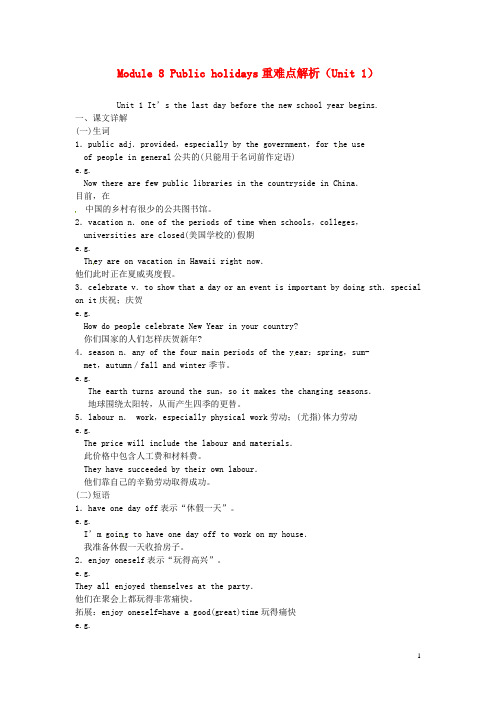
Module 8 Public holidays重难点解析(Unit 1)Unit 1 It’s the last day before the new school year begins.一、课文详解(一)生词1.public adj.provided,especially by the government,for t he useof people in general公共的(只能用于名词前作定语)e.g.Now there are few public libraries in the countryside in China.目前,在中国的乡村有很少的公共图书馆。
2.vacation n.one of the periods of time when schools,colleges,universities are closed(美国学校的)假期e.g.Th ey are on vacation in Hawaii right now.他们此时正在夏威夷度假。
3.celebrate v.to show that a day or an event is important by doing sth.special on it庆祝;庆贺e.g.How do people celebrate New Year in your country?你们国家的人们怎样庆贺新年?4.season n.any of the four main periods of the y ear:spring,sum-met,autumn/fall and winter季节。
e.g.The earth turns around the sun,so it makes the changing seasons.地球围绕太阳转,从而产生四季的更替。
5.labour n. work,especially physical work劳动;(尤指)体力劳动e.g.The price will include the labour and materials.此价格中包含人工费和材料费。
仁爱英语八年级下 Unit 7 Topic 2 重点短语、重点句型、难点辨析,语法详解
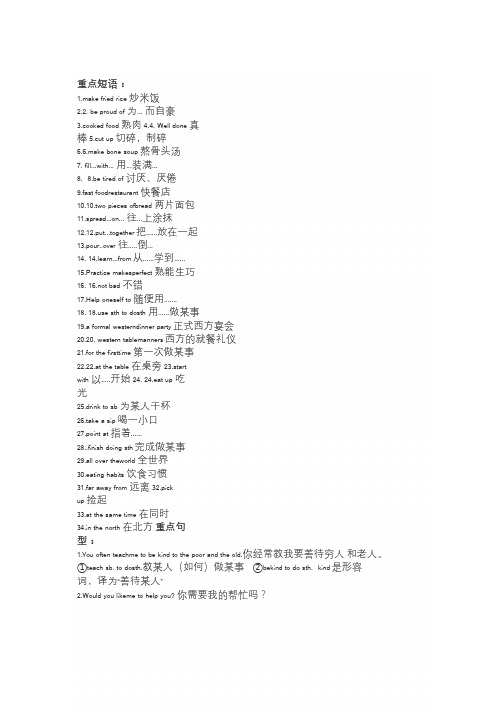
重点短语:1.make fried rice 炒米饭2.2. be proud of 为... 而自豪3.cooked food 熟肉4.4. Well done 真棒 5.cut up 切碎,制碎6.6.make bone soup 熬骨头汤7. fill...with... 用...装满...8. 8.be tired of 讨厌、厌倦9.fast foodrestaurant 快餐店10.10.two pieces ofbread 两片面包11.spread...on... 往...上涂抹12.12.put...together把......放在一起13.pour..over 往.....倒...14. 14.learn...from从......学到......15.Practice makesperfect 熟能生巧16. 16.not bad 不错17.Help oneself to 随便用.......18. e sth to dosth 用......做某事19.a formal westerndinner party正式西方宴会20.20. western tablemanners西方的就餐礼仪21.for the firsttime 第一次做某事22.22.at the table 在桌旁 23.startwith 以.....开始 24. 24.eat up 吃光25.drink to sb 为某人干杯26.take a sip 喝一小口27.point at 指着......28..finish doing sth完成做某事29.all over theworld 全世界30.eating habits 饮食习惯31.far away from 远离 32.pickup 捡起33.at the same time 在同时34.in the north 在北方重点句型:1.You often teachme to be kind to the poor and the old.你经常教我要善待穷人和老人。
八下英语第二单元重点
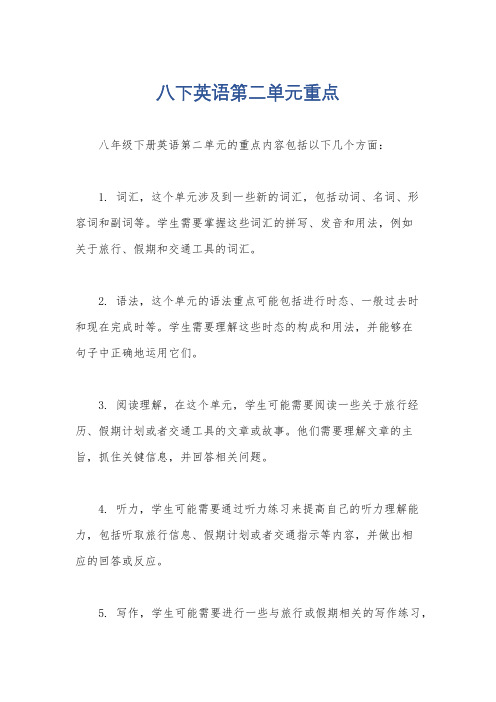
八下英语第二单元重点
八年级下册英语第二单元的重点内容包括以下几个方面:
1. 词汇,这个单元涉及到一些新的词汇,包括动词、名词、形
容词和副词等。
学生需要掌握这些词汇的拼写、发音和用法,例如
关于旅行、假期和交通工具的词汇。
2. 语法,这个单元的语法重点可能包括进行时态、一般过去时
和现在完成时等。
学生需要理解这些时态的构成和用法,并能够在
句子中正确地运用它们。
3. 阅读理解,在这个单元,学生可能需要阅读一些关于旅行经历、假期计划或者交通工具的文章或故事。
他们需要理解文章的主旨,抓住关键信息,并回答相关问题。
4. 听力,学生可能需要通过听力练习来提高自己的听力理解能力,包括听取旅行信息、假期计划或者交通指示等内容,并做出相
应的回答或反应。
5. 写作,学生可能需要进行一些与旅行或假期相关的写作练习,
比如写一篇关于自己假期计划的短文或者写一封给朋友的电子邮件,分享旅行经历。
总的来说,这个单元的重点是让学生掌握与旅行、假期和交通
工具相关的词汇、语法和表达能力,培养他们的阅读理解和听力理
解能力,同时提高他们的写作能力。
希望这些内容能够帮助你更好
地理解这个单元的重点。
人教版八年级英语下册 Unit 3 知识梳理及重难点讲练 (无答案)

人教新目标八年级英语下册Unit 3 单元知识梳理及重难点讲练知识梳理词汇:stress (n. 精神压力;心理负担) — stressed (adj. 有压力的)depend (v. 依靠;依赖) — dependent (adj. 依靠的) — dependence (n. 依赖) independent (adj. 独立的) — independence (n. 独立)fair (adj. 合理的;公正的) — fairness (n. 公正性;合理性)unfair (adj. 不合理的;不公正的) — unfairness (n. 不合理;不公正)neighbor (n. 邻居) — neighborhood (n. 社区)短语:do the dishes 洗餐具take out the rubbish 倒垃圾fold the clothes 叠衣服sweep the floor 扫地clean the living room 打扫客厅make the bed 铺床at least 至少;起码hang out 闲逛do chores 做家务throw down 扔下any minute now 随时,马上;在任何时候in surprise 惊讶地;吃惊地in a mess 杂乱不堪;陷入困境come over 过来;来访all the time 频繁;反复as soon as 一……就……the minute (that) —……就…… hate doing / to do sth. 讨厌做某事as...as... 像……一样…… a waste of 浪费……in order to 目的是;为了depend on 依靠;信赖have no idea 不知道in fairness 说句公道话take care of 照顾;处理as a result 结果fall ill 生病get a ride 搭车用法总结:Could you please...? 能请你……吗?finish doing sth. 完成做某事neither + be动词/ 助动词/ 情态动词+ 主语……也不make sb. (not) do sth. 使某人(不)做某事let sb. do sth. 让某人做某事spend time/money on sth. 在某事/物上花费时间/金钱provide sb. with sth.= provide sth. for sb. 为某人提供某物there is no need for sb. to do sth. 某人没有必要做某事The + 比较级,the + 比较级越……,越……do one's part in (doing) sth. 尽自己的职责做某事It + be + 名词(短语) + to do sth. 做某事是……It + be + 形容词+ for sb. to do sth. 对某人来说,做某事是……的。
人教版八年级下册各单元英语语法解析知识重点总结
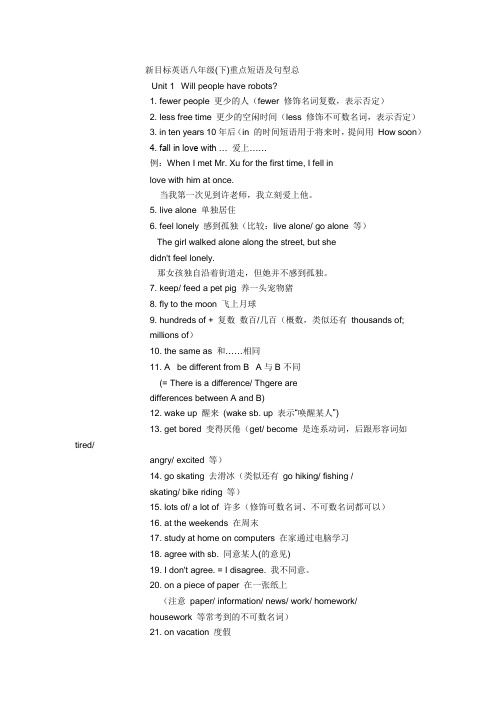
新目标英语八年级(下)重点短语及句型总Unit 1 Will people have robots?1. fewer people 更少的人(fewer 修饰名词复数,表示否定)2. less free time 更少的空闲时间(less 修饰不可数名词,表示否定)3. in ten years 10年后(in 的时间短语用于将来时,提问用How soon)4. fall in love with … 爱上……例:When I met Mr. Xu for the first time, I fell inlove with him at once.当我第一次见到许老师,我立刻爱上他。
5. live alone 单独居住6. feel lonely 感到孤独(比较:live alone/ go alone 等)The girl walked alone along the street, but shedidn't feel lonely.那女孩独自沿着街道走,但她并不感到孤独。
7. keep/ feed a pet pig 养一头宠物猪8. fly to the moon 飞上月球9. hundreds of + 复数数百/几百(概数,类似还有thousands of;millions of)10. the same as 和……相同11. A be different from B A与B不同(= There is a difference/ Thgere aredifferences between A and B)12. wake up 醒来(wake sb. up 表示“唤醒某人”)13. get bored 变得厌倦(get/ become 是连系动词,后跟形容词如tired/angry/ excited 等)14. go skating 去滑冰(类似还有go hiking/ fishing /skating/ bike riding 等)15. lots of/ a lot of 许多(修饰可数名词、不可数名词都可以)16. at the weekends 在周末17. study at home on computers 在家通过电脑学习18. agree with sb. 同意某人(的意见)19. I don't agree. = I disagree. 我不同意。
八年级英语下册:Unit 10 It’s a nice day, isn’t it重难点详解(人教新目标版)
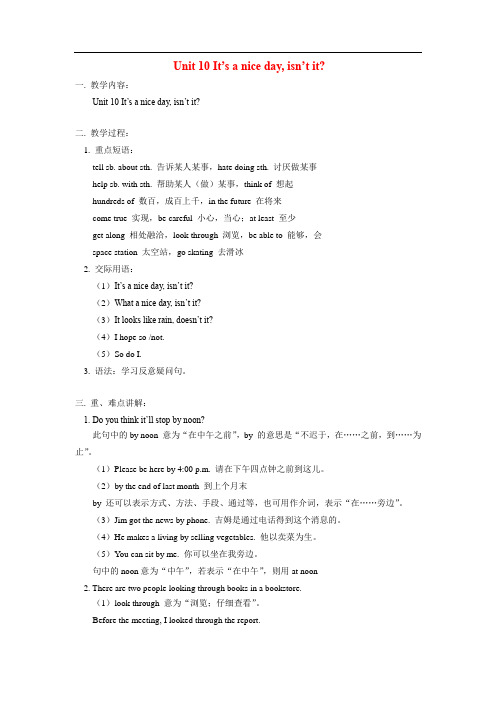
Unit 10 It’s a nice day, isn’t it?一. 教学内容:Unit 10 It’s a nice day, isn’t it?二. 教学过程:1. 重点短语:tell sb. about sth. 告诉某人某事,hate doing sth. 讨厌做某事help sb. with sth. 帮助某人(做)某事,think of 想起hundreds of 数百,成百上千,in the future 在将来come true 实现,be careful 小心,当心;at least 至少get along 相处融洽,look through 浏览,be able to 能够,会space station 太空站,go skating 去滑冰2. 交际用语:(1)It’s a nice day, isn’t it?(2)What a nice day, isn’t it?(3)It looks like rain, doesn’t it?(4)I hope so /not.(5)So do I.3. 语法:学习反意疑问句。
三. 重、难点讲解:1. Do you think it’ll stop by noon?此句中的by noon 意为“在中午之前”,by 的意思是“不迟于,在……之前,到……为止”。
(1)Please be here by 4:00 p.m. 请在下午四点钟之前到这儿。
(2)by the end of last month 到上个月末by 还可以表示方式、方法、手段、通过等,也可用作介词,表示“在……旁边”。
(3)Jim got the news by phone. 吉姆是通过电话得到这个消息的。
(4)He makes a living by selling vegetables. 他以卖菜为生。
(5)You can sit by me. 你可以坐在我旁边。
八年级英语教案语法重难点解析与讲解
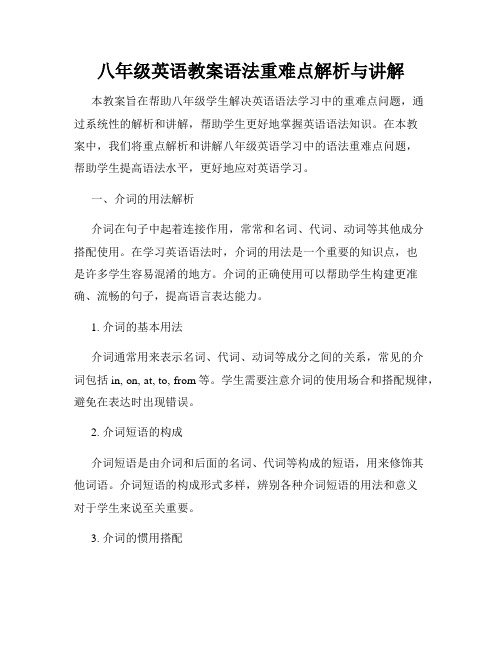
八年级英语教案语法重难点解析与讲解本教案旨在帮助八年级学生解决英语语法学习中的重难点问题,通过系统性的解析和讲解,帮助学生更好地掌握英语语法知识。
在本教案中,我们将重点解析和讲解八年级英语学习中的语法重难点问题,帮助学生提高语法水平,更好地应对英语学习。
一、介词的用法解析介词在句子中起着连接作用,常常和名词、代词、动词等其他成分搭配使用。
在学习英语语法时,介词的用法是一个重要的知识点,也是许多学生容易混淆的地方。
介词的正确使用可以帮助学生构建更准确、流畅的句子,提高语言表达能力。
1. 介词的基本用法介词通常用来表示名词、代词、动词等成分之间的关系,常见的介词包括in, on, at, to, from等。
学生需要注意介词的使用场合和搭配规律,避免在表达时出现错误。
2. 介词短语的构成介词短语是由介词和后面的名词、代词等构成的短语,用来修饰其他词语。
介词短语的构成形式多样,辨别各种介词短语的用法和意义对于学生来说至关重要。
3. 介词的惯用搭配一些介词在习惯搭配中有固定的用法,比如look forward to, be interested in等。
学生需要熟练掌握这些惯用搭配,避免在使用时出现错误。
二、动词时态的使用解析动词时态在英语语法中扮演着重要的角色,正确运用动词时态可以让句子更加准确和流畅。
然而,动词时态的使用往往是许多学生的难点之一,需要认真学习和掌握。
1. 简单时态的用法英语中的动词时态包括一般现在时、一般过去时、一般将来时等,学生需要了解不同时态的构成方式和用法,避免在使用时混淆。
2. 进行时态的表示方式进行时态用来表示正在进行的动作或状态,常常和表示时间的状语连用。
学生需要在学习中注意区分进行时态和其他时态的差异,准确运用进行时态。
3. 完成时态的表达方式完成时态用来表示已经完成的动作或状态,通常和表示时间段的状语连用。
学生需要了解完成时态的构成规律和用法,以便在表达时使用得当。
三、主谓一致的问题解析主谓一致是英语语法中的基本规则之一,表示主语与谓语在人称和数方面保持一致。
人教版八年级英语下册第二单元听写纸默写重难点

人教版八年级英语下册第二单元听写纸一、重点单词听写1.欢呼;喝彩____________2.志愿者________________3.标志;信号____________4.通知;通告____________5.孤独的;adj____________6.几个;数个____________7.强烈的;______________8.感觉;感触_____________9.满意__________________ 10.高兴;愉快____________ 11.主人_________________ 12.旅行;行程____________ 13.募集;征集___________ 14.独自;单独adv_________ 15.修理;修补___________ 16.修理;安装_____________ 17.破损的_______________ 18.车轮;轮子_____________ 19.信;函_______________ 20.有残疾的_______________ 21.失明的_______________ 22.聋的___________________ 23.设想;想象___________ 24.困难;难题_____________ 25.开;打开_____________ 26.门_____________________ 27.拿;提;扛___________ 28.训练;培训v_____________ 29.激动的_______________ 30.训练;培训n_____________ 31.仁慈;善良___________ 32.聪明的;聪颖的__________ 33.理解;领会___________ 34.变化;改变______________ 35.兴趣;关注___________ 36.夫人;女士______________二、重点词组默写1.打扫干净_________________2.使变得高兴________________3.分发;散发_______________4.提出______________________5.推迟_____________________6.打电话给某人______________7.照顾_____________________8.参加……选拔________________9.修理_____________________ 10.赠送______________________ 11.建立____________________ 12.像________________________ 13.影响____________________ 14.在同时____________________15.强烈的满足感______________ 16.耗尽;用完_________________三、重点句型1.我想要帮助无家可归的人。
2020年春人教新目标英语八年级下册Unit3课文重难点知识讲解
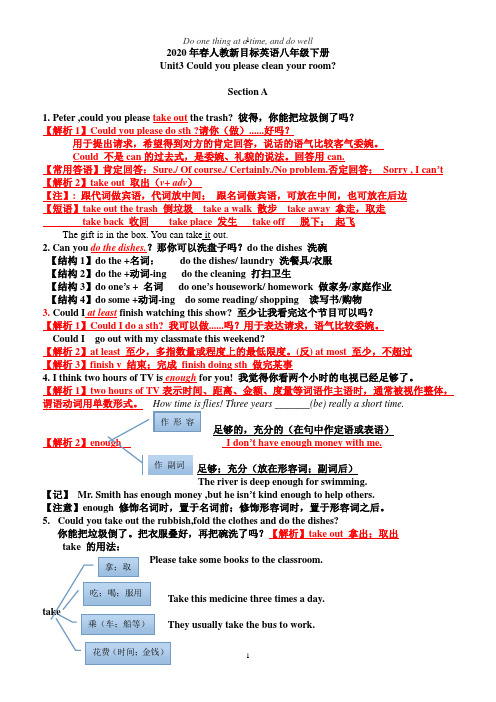
2020年春人教新目标英语八年级下册Unit3 Could you please clean your room?Section A1.Peter ,could you please take out the trash? 彼得,你能把垃圾倒了吗?【解析1】Could you please do sth ?请你(做)......好吗?用于提出请求,希望得到对方的肯定回答,说话的语气比较客气委婉。
Could 不是can的过去式,是委婉、礼貌的说法。
回答用can.【常用答语】肯定回答:Sure./ Of course./ Certainly./No problem.否定回答:Sorry , I can’t 【解析2】take out 取出(v+ adv)【注】: 跟代词做宾语,代词放中间;跟名词做宾语,可放在中间,也可放在后边【短语】take out the trash 倒垃圾take a walk 散步take away 拿走,取走take back 收回take place 发生take off 脱下;起飞The gift is in the box. You can take it out.2. Can you do the dishes.?那你可以洗盘子吗?do the dishes 洗碗【结构1】do the +名词:do the dishes/ laundry 洗餐具/衣服【结构2】do the +动词-ing do the cleaning 打扫卫生【结构3】do one’s + 名词do one’s housework/ homework 做家务/家庭作业【结构4】do some +动词-ing do some reading/ shopping 读写书/购物3.Could I at least finish watching this show? 至少让我看完这个节目可以吗?【解析1】Could I do a sth? 我可以做......吗?用于表达请求,语气比较委婉。
八年级英语下册:Unit 2 Plant a Plant Lesson 9-Lesson 12重难点
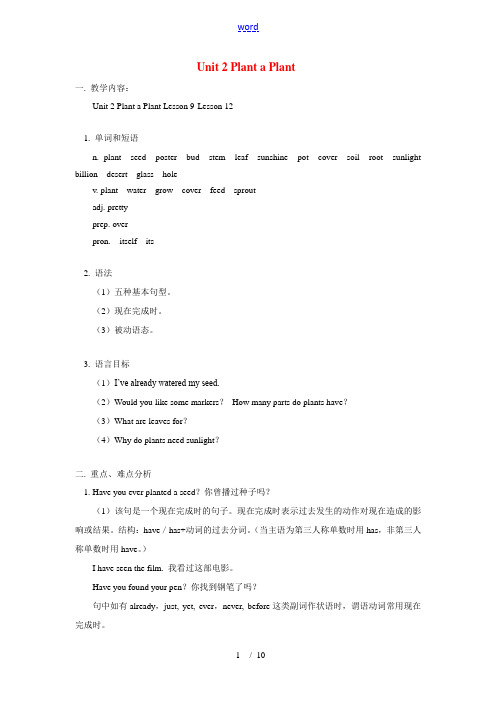
Unit 2 Plant a Plant一. 教学内容:Unit 2 Plant a Plant Lesson 9-Lesson 121. 单词和短语n. plant seed poster bud stem leaf sunshine pot cover soil root sunlight billion desert glass holev. plant water grow cover feed sproutadj. prettyprep. overpron. itself its2. 语法(1)五种基本句型。
(2)现在完成时。
(3)被动语态。
3. 语言目标(1)I’ve already watered my seed.(2)Would you like some markers?How many parts do plants have?(3)What are leaves for?(4)Why do plants need sunlight?二. 重点、难点分析1. Have you ever planted a seed?你曾播过种子吗?(1)该句是一个现在完成时的句子。
现在完成时表示过去发生的动作对现在造成的影响或结果。
结构:have/has+动词的过去分词。
(当主语为第三人称单数时用has,非第三人称单数时用have。
)I have seen the film. 我看过这部电影。
Have you found your pen?你找到钢笔了吗?句中如有already,just, yet, ever,never, before这类副词作状语时,谓语动词常用现在完成时。
(2)seed n. 种子,也可作动词,意为“播(种)”。
This is a bag of sunflower seeds. 这是一袋葵花籽。
We plant seeds in the field. 我们在地里播种。
They are seeding a field with wheat. 他们在地里播种小麦。
(完整word版)仁爱版英语八年级下册整册教案
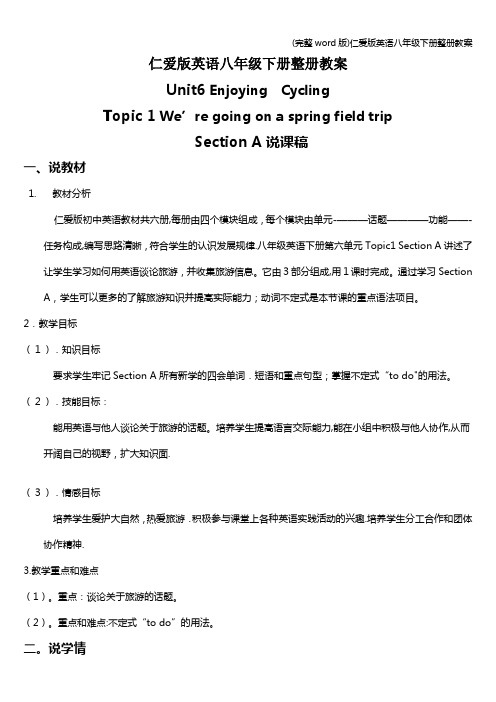
仁爱版英语八年级下册整册教案Unit6 Enjoying CyclingTopic 1 We’re going on a spring field tripSection A说课稿一、说教材1. 教材分析仁爱版初中英语教材共六册,每册由四个模块组成,每个模块由单元-———话题————功能——-任务构成,编写思路清晰,符合学生的认识发展规律.八年级英语下册第六单元Topic1 Section A讲述了让学生学习如何用英语谈论旅游,并收集旅游信息。
它由3部分组成,用1课时完成。
通过学习Section A,学生可以更多的了解旅游知识并提高实际能力;动词不定式是本节课的重点语法项目。
2.教学目标(1).知识目标要求学生牢记Section A所有新学的四会单词.短语和重点句型;掌握不定式“to do"的用法。
(2).技能目标:能用英语与他人谈论关于旅游的话题。
培养学生提高语言交际能力,能在小组中积极与他人协作,从而开阔自己的视野,扩大知识面.(3).情感目标培养学生爱护大自然,热爱旅游.积极参与课堂上各种英语实践活动的兴趣.培养学生分工合作和团体协作精神.3.教学重点和难点(1)。
重点:谈论关于旅游的话题。
(2)。
重点和难点:不定式“to do”的用法。
二。
说学情1.学生对旅游较感兴趣,但对旅游知识了解较少.2。
学生的词汇量掌握不多.3. 学生平时较少用英语与他人交谈并表达信息..三。
说教法学法按照课程改革的要求,遵循“老师由主演变导演,学生由配角变主角”的角色转换,采用把课堂交给学生的教学理论,我运用自由讨论。
分组工作.结对练习。
问答练习等方法,借助多媒体、录音机,图片等教学手段,设置特定的语言环境,使学生在轻松愉快的气氛中理解.运用英语。
四.说教学程序我设计了以下的步骤来训练学生的听.说。
读。
写的能力,尤其是他们“说”的能力。
(一)温故知新(1).请两位学生用上节课重点句型号,分别复述Unit 5 Topic3 Section D 1a(2).教师与学生之间进行问答对话,让学生谈论关于他们最喜爱的旅游方式.设计意图:巩固上节课学过的知识,为学习新课铺垫.(二)情景导入用多媒体展示一些关于旅游和交通的图片,来引起学生的兴趣,并由此教学本节课的新单词,如:field ,trip ,cycle ,vehicle ,airline等。
人教新目标英语八年级下册Unit-4---5重难点知识复习

重难点知识复习Unit 4 Why don’t you talk to your parents?一.词型转换。
relation n.关系----relationship n.关系communicate v.交流-----communication n.交流argue v.争执---- argument n.争执cloud n云--- cloudy adj.多云的proper adj.合适的---- properly adv.合适地explain v.解释---- explanation n.解释clear adj.清楚的--- clearly adv.清楚地press v.按、压---- pressure n.压力compete v.竞争--- competition n.竞赛quick adj.快的--- quickly adv. 快地develop v.发展--- development n.发展usual adj.普遍的--- usually adv.通常unusual adj.不寻常的二、重点短语1. have free time to do sth有空闲时间2. allow sb. to do sth. 允许某人做某事allow doing sth 允许做某事be allowed to do sth 被允许做某事3. hang out with sb. 与某人闲逛4. have \ take after-school classes课外活动课5. get into a fight with sb. 与某人吵架/打架fight with与某人吵架/打架have a fight with sb 与某人吵架/打架6. until midnight直到半夜7. talk to sb. 与某人交谈8. wait that long 等太久9. study too much学得过多10. get enough sleep有足够的睡眠11. write sb. a letter给某人写信12. talk about sth on the phone在电话上交谈某事13. surprise sb. 令某人惊讶14. look through翻看15. be angry with sb. 生某人的气16. a big deal重要的事deal with sth.处理某事17. work out成功地发展;解决18. get on\along with和睦相处;关系良:19. fight a lot经常吵架/打架20. hang over笼罩21. refuse to do sth. 拒绝做某事22. offer to do sth. 主动提出做某事23. so that以便24. mind sb. doing sth. 介意某人做某事25. all the time一直26. in future今后27. make sb. angry使某人生气28. worry about sth. 担心某事29. copy one’s homework抄袭某人的作业30. be oneself做自己31. family members 家庭成员32. spend time alone独自消磨时光33. give sb. pressure给某人施压34. argue with sb\have an argument with sb.与某人吵架35. compete with sb. 与某人竞争36. free time activities业余活动37. get better grades取得更好的成绩38. give one’s opinion提出某人的观点in one’s opinion 在某人看来39. learn exam skills学习应试技巧40. all kinds of 各种各样的a kind of 一种kind of +adj.有点41. cause stress造成压力42. cut out删除43.be nice to sb 对。
最新人教版英语八年级下册Unit8-10语法重难点:现在完成时 专项复习 (有答案)
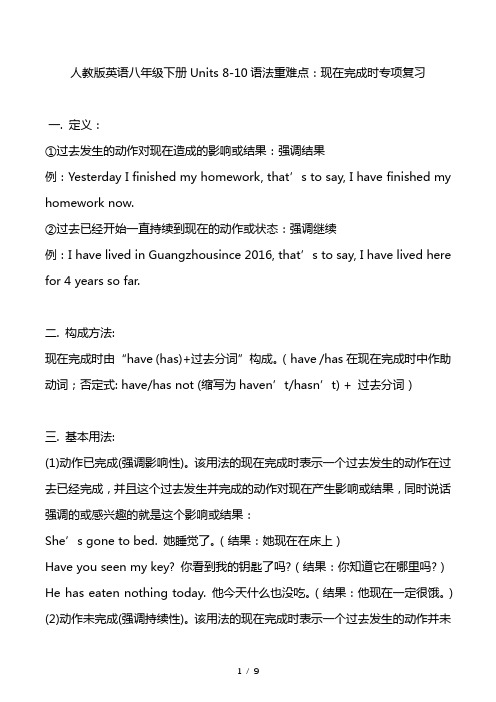
人教版英语八年级下册Units 8-10语法重难点:现在完成时专项复习一. 定义:①过去发生的动作对现在造成的影响或结果:强调结果例:Yesterday I finished my homework, that’s to say, I have finished my homework now.②过去已经开始一直持续到现在的动作或状态:强调继续例:I have lived in Guangzhousince 2016, that’s to say, I have lived here for 4 years so far.二. 构成方法:现在完成时由“have (has)+过去分词”构成。
(have /has在现在完成时中作助动词;否定式: have/has not (缩写为haven’t/hasn’t) + 过去分词)三. 基本用法:(1)动作已完成(强调影响性)。
该用法的现在完成时表示一个过去发生的动作在过去已经完成,并且这个过去发生并完成的动作对现在产生影响或结果,同时说话强调的或感兴趣的就是这个影响或结果:She’s gone to bed. 她睡觉了。
(结果:她现在在床上)Have you seen my key? 你看到我的钥匙了吗?(结果:你知道它在哪里吗?)He has eaten nothing today. 他今天什么也没吃。
(结果:他现在一定很饿。
)(2)动作未完成(强调持续性)。
该用法的现在完成时表示一个过去发生的动作并未在过去完成,而是一直持续到现在,并且有可能继续下去(也可能到此结束):Have you waited long? 你等了很久吗?We have been busy this afternoon. 今天下午我们一直很忙。
I抳e waited a week for your answer. 等你的回答我等了一个星期。
除以上用法外,现在完成时还可表示过去的重复动作甚至将来动作:He has always gone to work by bike. 他总是骑自行车上班。
八年级英语chapter3语法重难点讲解3

八年级英语chapter3语法重难点讲解3Chapter Three【本讲教育信息】一. 教学内容:Chapter Three: Dealing with trouble: reading[学习过程]一、重点句子:1. Today my father and I were waiting for the ferry .今天我爸爸和我正在等渡轮。
在此句中所用的时态是过去进行时,这一时态的基本结构是was/were+ v.-ing 形式。
它与一般过去时态不同。
一般过去时态用于陈述过去的事实, 而过去进行时态用于描述过去某个时间里正在发生的动作,句中常有具体的表示过去的时间点或时间段。
I was watching the World Cup Final at 7 o’clock yesterday evening.昨晚7点,我正在看世界杯决赛。
He watched the World Cup Final yesterday evening. 昨晚他看了世界杯决赛。
这一时态用于描述过去某一时刻正在发生的动作。
而现在进行时描述的是目前正在发生的动作。
I was having my breakfast then. 那时我正在吃早餐。
I’m having my breakfast now.现在我正在吃早餐。
You were sleeping then. 当时你正在睡觉。
They are sleeping now. 现在他们正在睡觉。
wait for 表示:等候,等待.wait 是一个不及物动词,后接宾语时,必须用短语wait for.Please wait here. He will be back in a minute. 请等在这儿吧。
他一会儿就会回来。
We should wait for help. 我们应该等待帮忙。
Will you wait for me for a while?你等我一会好么?2. This afternoon we heard a big argument. 今天下午我们听见一场大声的争论。
2020 - 2021学年人教新目标八年级英语下册Unit2 知识归纳及重难点讲练(无答案)
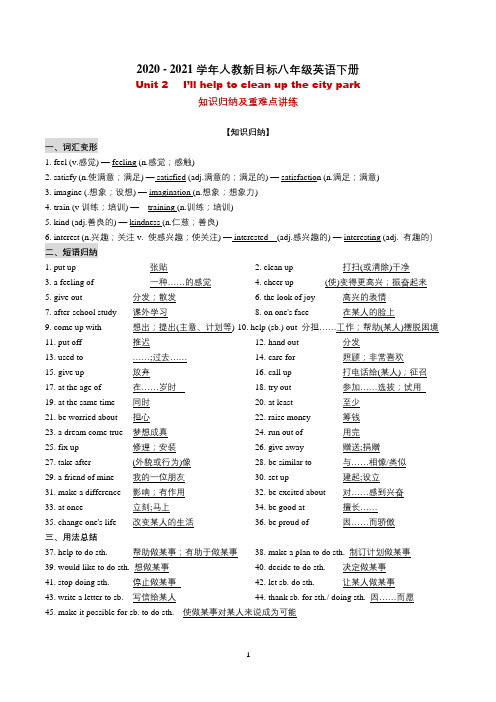
2020 - 2021学年人教新目标八年级英语下册Unit 2 I’ll help to clean up the city park知识归纳及重难点讲练【知识归纳】一、词汇变形1. feel (v.感觉) — feeling (n.感觉;感触)2. satisfy (n.使满意;满足) — satisfied (adj.满意的;满足的) — satisfaction (n.满足;满意)3. imagine (.想象;设想) — imagination (n.想象;想象力)4. train (v训练;培训) —training (n.训练;培训)5. kind (adj.善良的) — kindness (n.仁慈;善良)6. interest (n.兴趣;关注v. 使感兴趣;使关注) — interested (adj.感兴趣的) — interesting (adj. 有趣的)二、短语归纳1. put up 张贴2. clean up 打扫(或清除)干净3. a feeling of 一种……的感觉4. cheer up (使)变得更高兴;振奋起来5. give out 分发;散发6. the look of joy 高兴的表情7. after-school study 课外学习8. on one's face 在某人的脸上9. come up with 想出;提出(主意、计划等) 10. help (sb.) out 分担……工作;帮助(某人)摆脱困境11. put off 推迟12. hand out 分发13. used to ……;过去……14. care for 照顾;非常喜欢15. give up 放弃16. call up 打电话给(某人);征召17. at the age of 在……岁时18. try out 参加……选拔;试用19. at the same time 同时20. at least 至少21. be worried about 担心22. raise money 筹钱23. a dream come true 梦想成真24. run out of 用完25. fix up 修理;安装26. give away 赠送;捐赠27. take after (外貌或行为)像28. be similar to 与……相像/类似29. a friend of mine 我的一位朋友30. set up 建起;设立31. make a difference 影响;有作用32. be excited about 对……感到兴奋33. at once 立刻;马上34. be good at 擅长……35. change one's life 改变某人的生活36. be proud of 因……而骄傲三、用法总结37. help to do sth. 帮助做某事;有助于做某事38. make a plan to do sth. 制订计划做某事39. would like to do sth. 想做某事40. decide to do sth. 决定做某事41. stop doing sth. 停止做某事42. let sb. do sth. 让某人做某事43. write a letter to sb. 写信给某人44. thank sb. for sth./ doing sth. 因……而愿45. make it possible for sb. to do sth. 使做某事对某人来说成为可能重难点讲练考点一:use 与used的用法(1) use v. 使用→useful adj. 有用的use up 用完(2) use sth to do sth 用某物做某事(3) used to do sth 过去常常做某事,表示过去做过的事现在已经不做,只用于过去时态。
2020年春人教新目标英语八年级下册Unit4单元重难点知识点总结讲练(无答案)
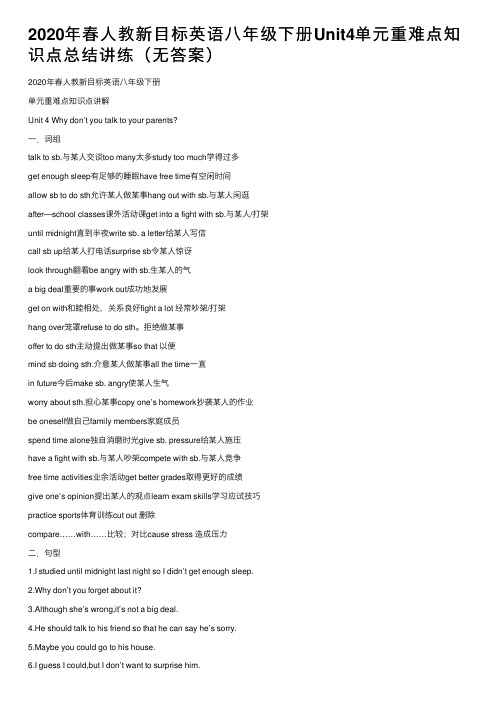
2020年春⼈教新⽬标英语⼋年级下册Unit4单元重难点知识点总结讲练(⽆答案)2020年春⼈教新⽬标英语⼋年级下册单元重难点知识点讲解Unit 4 Why don’t you talk to your parents?⼀.词组talk to sb.与某⼈交谈too many太多study too much学得过多get enough sleep有⾜够的睡眠have free time有空闲时间allow sb to do sth允许某⼈做某事hang out with sb.与某⼈闲逛after—school classes课外活动课get into a fight with sb.与某⼈/打架until midnight直到半夜write sb. a letter给某⼈写信call sb up给某⼈打电话surprise sb令某⼈惊讶look through翻看be angry with sb.⽣某⼈的⽓a big deal重要的事work out成功地发展get on with和睦相处,关系良好fight a lot 经常吵架/打架hang over笼罩refuse to do sth。
拒绝做某事offer to do sth主动提出做某事so that 以便mind sb doing sth.介意某⼈做某事all the time⼀直in future今后make sb. angry使某⼈⽣⽓worry about sth.担⼼某事copy one’s homework抄袭某⼈的作业be oneself做⾃⼰family members家庭成员spend time alone独⾃消磨时光give sb. pressure给某⼈施压have a fight with sb.与某⼈吵架compete with sb.与某⼈竞争free time activities业余活动get better grades取得更好的成绩give one’s opinion提出某⼈的观点learn exam skills学习应试技巧practice sports体育训练cut out 删除compare……with……⽐较;对⽐cause stress 造成压⼒⼆.句型1.I studied until midnight last night so I didn’t get enough sleep.2.Why don’t you forget about it?3.Although she’s wrong,it’s not a big deal.4.He should talk to his friend so that he can say he’s sorry.5.Maybe you could go to his house.6.I guess I could,but I don’t want to surprise him.三.⽇常交际⽤语1.——What’s wrong? ——I’m really tired because I studied until midnight last night. ——Why don’t you go to sleep earlier this evening?2.——What’s the matter,Peter?——I had a fight with my best friend.3.——What should I do?——Well,you should call him so that you can say you’re sorry.4.——Thanks for your advice. ——No problem.Section A1.辨析too much与too manytoo much“太多”+不可数名词too many“太多”+可数名词复数He drank too much beer yesterday. She talked too much.Too many children are playing on the playground.【提⽰】much too“太……,⾮常……”+adj./adv——Why are you so tired these day?【练习】——Well,I have ______work to do.A.too muchB.too manyC.much tooD.many too2.allow 允许,许可allow常见⽤法如下:(1)allow sb to do sth. “允许某⼈做某事”My parents allow me to go out at night.(2)allow doing sth.“允许做某事”+v_ingThe library doesn’t allow taking loudly. She doesn’t allow smoking in her house.(3)allow+名词We can’t allow such a thing.【练习】The young should be allowed __________(achieve)their dreams on their own.Do you often allow _______until 11:00 p.m.?A.to stay upB.stay upC.staying upD.and stay up3.work out产⽣……效果,进展……Things worked out quite well for us.【拓展】work out “计算出,设法弄明⽩”He worked out the answer by computing again,but more carefully.You’d better work out a plan to improve your writing skills.Can you work out the problem alone?【练习】保持句意基本不变Jessica solved the physics problems without any help.Jessica________ _________the physics problems without any help.4.get on with……Mrs Smith gets on well with her neighbors.go on with+sb. “与……相处” +sth “进展”=get doing with……表⽰相处的如何,在with前加well(好)或badly(差)等修饰词。
- 1、下载文档前请自行甄别文档内容的完整性,平台不提供额外的编辑、内容补充、找答案等附加服务。
- 2、"仅部分预览"的文档,不可在线预览部分如存在完整性等问题,可反馈申请退款(可完整预览的文档不适用该条件!)。
- 3、如文档侵犯您的权益,请联系客服反馈,我们会尽快为您处理(人工客服工作时间:9:00-18:30)。
WORD格式北师大版八年级英语下册重难点讲解:Unit7 Living Together一 . 教学内容:复习 Unit 7 二 . 教学重点:1. 复习一般过去时和过去进行时及区别。
2. 反身代词的用法。
3. 频度副词在一般现在时中的应用。
4.重点词组解析。
三 . 具体内容(一)一般过去时和过去进行时的区别:1. 一般过去时常表示在过去某时发生的动作或存在的状态(包括过去的习惯动作),常与一般过去时连用的时间状语有:just now, a moment ago, yesterday, last week/month/year, the day beforeyesterday 及表示过去的时间状语从句。
e.g. I met her in the street the day before yesterday.Ex. Hangzhou is a nice city. My dad()me there when I was about ten years old.A. pulled B.caught C. took D. brought2.过去进行时常用的时间状语有:at that time/moment, at this time yesterday, at点+钟+yesterday,时间状语从句。
e.g. What were you doing at seven yesterday?()on the computer when Jim came to see me yesterday evening.A. draw B. drew C.was drawing D. am drawing3.一般过去时往往表示某一动作已经发生,而过去进行时却表示动作在持续。
e.g. She wrote a letter to her friend last night. She was writing a letter to her friend atnine last night.Ex. -Why didn’ yout give me a phone call?-- I () . But nobody answered the phone.A.do B. did C. will D. have注意:下面几种情况不用一般过去时而要用过去进行时:1)表示过去某一阶段正在进行或暂时性的动作。
Tom was studying in Paris last term.2)与 always连用表示赞美,厌烦等感情色彩时。
e.g. John was always coming to school late.3)用来描写故事发生的情景。
It was a dark night. The wind was blowing hard and the rain was falling heavily. A young man suddenly appeared on the riverbank. He wanted to cross the river.4) when 作并列连词,表示“这时(突然)”之意时,第一个并列分句用过去进行时,when 引导的并列分句用一般过去时。
I was taking a walk when I met him.5)go, come, leave, start, arrive等动词可用过去进行时表示过去将来的含义。
I was leaving for Wuhanthat day.Ex. ( 1) It was warm, so I(take) off my coat.(2)John(take) a photograph of me whileI(read).( 3 ) Jane(wait) for me when I(arrive).(4)Sue wasn’t hungry, so she(not eat) anything.( 5 ) It was hard work to carry the bags. They(be) very heavy.(6)When I was young,I(want) to be a bus driver.(二)频度副词在一般现在时中的应用。
表示动作发生的频率程度的副词叫做频度副词,如seldom, always, often, sometimes等。
一般常用在一般现在时中,放在 be动词,情态动词及第一个助动词之后,实义动词之前。
always often usually sometimes seldom ever(曾经) nevere.g He is seldomill.You must always remember this. Do you usually go to school on foot?有时为了加强语气,频度副词也可以放在句首。
e.g. Sometimes she goes to school by bus andsometimes she goes to school by bike.Ex.1.- Does Liu Hua ever guess the meanings of English words?-No, he guesses the meanings of new words. He uses his dictionary all the time. A. usually B. always C. never D. sometimes2. English people use Mr. before a man’ s first nameA.never. B. usually D. sometimes3. If you want to learn English well, you must use it as as possible. A. often B. long C. hard D. soon4. She always gets up early and so she is late for school. A. sometimes B. usually C.专业资料整理WORD 格式neverD. often5.Ibelieve what he says. A. don’ t always B. always don ’t C. not always D. always not6. -I hate vegetables. Ieat them. -But they’ re good for your health. You should often eat themA..seldomB. oftenC. usuallyD. always7.The sunrises in the east and sets in the west. A. neverB. oftenC. seldomD. always(三)反身代词的构成:第一第二人称的反身代词由形容词性物主代词加 -self或 -selves构成,第三人称的反身代词由人称代词的宾格加-self或 -selves 构成。
1. 反身代词不能表示 “某人的(东西) ”之意,因为反身代词没有所有格形式,不能作定语。
表示“某人自己的 ”,须用 one ’ s own.e.g. I saw the accident with myself eyes(.F )I saw the accident with my own eyes( .T )反身代词不能作主语,但可以作主语的同位语,起强调作用。
Herself is a teacher (.2. )SheFherself is a teacher ( . T )有用的词组: teach oneself 自学 enjoyoneself 玩得高兴help oneself随便吃 say tooneself 自言自语hurt oneself伤着自 己 dress oneself自己 穿衣 by oneself独自地for oneself 为自己). It ’ as newEx.1. Be careful not tohurt(knife.2. I don ’ needt any help. Ican do it allby( )3. -Did you enjoy()?- Yes, we enjoyed() very much. 4. She thinks more of othersthan of( ) .5. He is too young to teach( )English.6. Help()to some cakes, children.(四)重点解析。
1. I hope to see you next week.hope to do sth./that从句e.g. She hopes to get a job overseas.I hope you won ’ t be late.2. There are many different ways to show respect to older people. show respect to g?.I ehave. thegreatest respect foryou.I respect you for your honesty.3. All the buildings are supposed to provide special facilities for people in wheelchairs.be supposedto do被期望或被要求做某事e.g. You’ re supposed to pay the bill by Fridayprovide. sth. for sb.Can you provide somedrinksfor us? 4.Do you give up your seat to an older person on a bus or a subway?give up sth/doing sth.e.g. She didn’ t give up her job when she got married. 5. Don ’ t you say “ Please ” when asking someone for something? ask sb. for sth. e.g. Jim always asks mom for some money.Ex.1. He hopes() a doctor when he grows up. A. / B. to being C. to be D. being) the old society2.There are some people who don’ showt respect(in. A. to B. in C. at D. of3. Bill() give a lecture on Saturday afternoon. A. is supposed to B. was supposed to C. be supposed to D. supposed to4. The government will provide food and drinks()the people who suffer poverty.A. to B. for C. with D. on) smoking for it is bad for his health.A. give5. The doctor asks the old man to(up B. put up C. get off D. put down6.She always asks her mother ()something to eat. A. to B. for C. at D. on专业资料整理WORD格式同步练习【试题答案】I. 1. playing 2. spending, watching(spend sth on sth或spend sth (in) doing sth) 3. doing (feel like sth/doing sth想要某物或想要做某事) 4. waiting(stand表示容忍,忍受)5.to see 6. swimming 7. to buy 8. to visit 9. to meet 10. listening II. 1. on, in,from 2. during 3. by, on 4. with, on 5. in, for专业资料整理。
